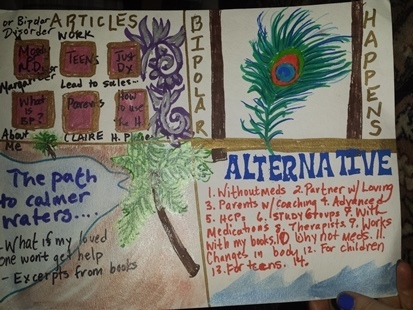Julie A. Fast's Blog, page 48
July 17, 2014
What Does Bipolar Disorder Mania Look Like?
My number one tip for managing bipolar disorder? Know what your mood swings look like from the minute they start. The very first thought of mania for example often tells you all you need to know. “The colors are so gorgeous today!” is a thought I get when I start hypomania. I don’t think this way normally. When I’m in an average mood, I will notice colors, but I don’t FEEL THEM PHYSICALLY like I do when manic. I now know that having this simple thought-
‘The colors are GORGEOUSSSSSSS today’
is a sign that I’m not stable. I go into action and make sure I manage the bipolar instead of running around buying 25 new Sharpies, a set of paints and some watercolor paper so that I can capture the moment! Ha!
Here’s a picture I use when I train health care professionals and want to show them what my hypomania looks like. This is hilarious because it’s literally made of Sharpies, watercolors and watercolor paper. All bought while hypomanic.I never, ever draw this way when I”m stable. I actually can’t! I control my mania as best I can and usually succeed! Thank you Health Cards!
Related posts:
Bipolar Disorder Agitated Mania/Dysphoric Mania
Bipolar Disorder Moodswings
Bipolar Disorder Mania Check In
Just Diagnosed with Bipolar Disorder? I know what you’re going through!
I remember how it feels.
When I was finally diagnosed in 1995 (after a slightly manic trip to China!), I was very relieved to have an explanation for why I had been so odd for so long. Many questions were answered.
If you were diagnosed, you may be very scared, worried or even incredulous. What? I have a serious mental illness! No way! Then you read all of the symptoms and it makes sense.
If you love someone with the illness, you are probably scared and worried
Here are some facts about bipolar disorder:
- People with bipolar disorder can absolutely get better after a diagnosis! Most do.
- Bipolar disorder medications work. They have side effects and they can make you fat and upset, tired and cranky, but they work. They save lives in many ways. I tried 22 meds until I found the right medications. My meds changed recently as my depression increased- this is normal- and I am now on Lithium, Lamictal, Zoloft (this is safe if used with a mood stabilizer), Ritalin (safe if used with a mood stabilizer) and Ativan. I am doing the best I have done in many, many years.
I have always had a love affair with Lamictal. It’s a medication I feel that everyone with bipolar disorder should try.
Some people do fine with just a few medications. Everyone is different.
If you have bipolar disorder, keep trying until you find the right medication. It’s 100% worth it.
Medications take care of half of the illness, the other half is management.
- If you care about someone with the illness, you need to be just as educated as the person with the diagnosis. Bipolar disorder affects everyone. There are no exceptions. If you love someone with the illness, you are affected in some way. That is why you are on this blog getting information. Information is POWER and you can definitely learn to help the person with bipolar disorder. My mother and eventually my father have learned how to help me. it took time, but it happened.
- Bipolar disorder is genetic. You have done nothing wrong. Not as a person with the illness or as a parent. It’s genetic.
- There is a good chance that if you or someone you love has bipolar, someone in your family has either depression or bipolar. This is often masked as anxiety. Bipolar disorder is genetic and runs deeply in families.
- Bipolar disorder comes in two major forms: Bipolar I (one) and Bipolar II (two). This blog has a lot of information on the differences between the two. It’s estimated that 4-6% of the population has bipolar disorder. If you read a lower number, it’s not up to date research and may just reflect bipolar I diagnoses.
- It takes work to manage the illness. A lot of work for some, not as much for others. A management plan is essential. This includes medications, trigger management and a lot of lifestyle changes.
So, if you’re just diagnosed, it’s going to be OK. If you love someone who was just diagnosed, you can learn to help and to take care of yourself at the same time.
It’s an illness. It can be treated.
The category list on the menu to the right has valuable information on bipolar disorder. The first couple of months are the hardest, but it gets better. The blogs can help.
Julie
Related posts:
Just Diagnosed with Bipolar Disorder?
Reader question- why did it take so long for me to get diagnosed?
Just Diagnosed with Bipolar Disorder?
July 14, 2014
July 13, 2014
Bipolar Disorder Poll: What Symptom is the Hardest for Your Family and Friends to Understand?
Over 200 readers have voted. I want to put this poll up again to see if the mood has changed in the past few years. What is your answer? If you care about someone with bipolar disorder, please give your opinion as well. I’m actually surprised at the results. I thought that the highest vote would be mania! Let’s see what it’s like in 2014! Julie
Take Our Poll
Related posts:
What do you want your family to understand about bipolar disorder?
Bipolar Happens Poll – Symptoms and Family Members
Would You Have a Relationship with Someone who has Bipolar Disorder?
July 12, 2014
What is the Difference between Bipolar Disorder and Schizoaffective Disorder?
It’s pretty easy to tell the difference between bipolar disorder and schizo affective disorder once you know what to look for.
Bipolar disorder is an episodic disorder that has two main mood swings: MANIA and DEPRESSION. A person with bipolar disorder can also have psychosis. Statistically, 70% of people with bipolar disorder one will have psychosis when they are in a full blown manic episode. This means that most people with bipolar disorder one have psychosis. People with bipolar disorder two can also have psychosis- I do- but it rarely comes with hypomania which is the type of mania you see in bipolar disorder two. This means that SOME people with bipolar disorder two will have psychosis, but it will almost always be associated with depression.
Here is the important point to remember:
Bipolar disorder psychosis is ALWAYS attached to either a manic or depressive mood swing. It doesn’t exist on its own.
If a person has bipolar disorder and experiences psychosis when they are NOT manic or depressed, this is considered schizo-affective disorder. The word schizo is used to describe the psychosis and affective simply means mood. So we could translate this as Psychotic-Mood disorder.
Please note that schizo affective disorder DOES NOT mean that a person has bipolar disorder and schizophrenia. Here is the definition of schizoaffective disorder:
When a person who has bipolar disorder has psychosis that is separate from either a manic or depressive mood swing, they receive the schizoaffective disorder diagnosis. Schizophrenia comes with many, many more symptoms than psychosis that a person with schizoaffective disorder may or may not have. It is possible to have a type of schizophrenia such as paranoid schizophrenia and bipolar disorder and still get the schizoaffective disorder diagnosis, but in general, the schizoaffective diagnosis simply means psychosis outside of mania and depression.
Sherry Joiner, the author of Sherry Goes Sane: Living a Life with Schizoaffective Disorder notes: It’s possible for a person with the kind of schizoaffective disorder that I have to switch back and forth between an actual schizophrenia episode and then a bipolar disorder episode. They can be separate. During schizo-affective disorder you have mania and depression with psychosis going on all of the time. I manage mine with medications, seeing my health care team, painting, working with people in the psych ward, giving speeches for NAMI’s In Our Own Voice, maintaining my relationships, writing on my blog and using what I call Sherry’s Master Plan to manage the illness daily. It’s all in my book! With my schizo affective disorder, I have episodes of depression and mania, but my psychosis is continual. That is the difference!
I love learning about all types of mental health disorders. It helps with my coaching and it definitely makes me a better writer!
Julie
PS: Click here to read more about Sherry’s latest book contest where you can win one of her original paintings! If you have any questions for Sherry about schizoaffective disorder, please leave them in the comments section and I will pass them on to her!
Related posts:
Bipolar Disorder and Schizoaffective Disorder: What is the difference?
Guest Blogger: Sherry Joiner author of Sherry Goes Sane: Living a Life with Schizoaffective Disorder
Reader Question: What is the difference between schizophrenia and bipolar disorder?
Book contest with Sherry Joiner author of Sherry Goes Sane: Living a Life with Schizoaffective Disorder
Win a painting in the Sherry Goes Sane book contest!
Click here for information on how you can win this beautiful picture from my friend and fellow mental health writer Sherry Joiner the author of Sherry Goes Sane: Living a Life with Schizoaffective Disorder. I love to support other mental health writers.
Many of my readers have schizoaffective disorder- it’s similar to bipolar disorder of course, but comes with its own challenges. Sherry is SUCH a success story! I know you will love her book! Julie
Related posts:
Guest Blogger: Sherry Joiner author of Sherry Goes Sane: Living a Life with Schizoaffective Disorder
What is the Difference between Bipolar Disorder and Schizoaffective Disorder?
Guest Blogger: Dawn and Schizoaffective Disorder
Bipolar Disorder on the Road Book Excerpt 2: Why does travel trigger bipolar disorder symptoms?
Click here to read part one of this series on bipolar disorder and travel.
What is the goal of my next book On the Road with Bipolar Disorder: Four Steps to Successful and Stable Travel?
The goal of this book is to help you manage your bipolar disorder before, during and after you travel. It’s a four step process:
1. Prep
2. Travel
3. You’re There
4. Back Home
Have you ever noticed that stories in the news about troublesome bipolar disorder behavior often involve travel? This happens because travel condenses a large number of bipolar disorder triggers into a very short period of time. Here are the most common bipolar disorder triggers due to travel:
1. Travel puts you in different time zones. Anything that changes your sleep has the potential to cause mood swings. The more opposite your regular sleep pattern, the more dangerous the time change is for bipolar disorder. Time zones that flip your sleep schedule are the most concerning.
2. Travel often takes you to stimulating situations such as business meetings, weddings, holidays and fun vacations to foreign countries. As you know, stress doesn’t mean something is bad. It means change. Any change can cause stress and travel is filled with changes.
3. Long term travel requires a lot of specific planning. Planning and bipolar disorder often clash. This is when anxiety can really show up and make planning difficult.
4. Travel puts you into small spaces with family members. Travel isn’t only about vacations. It can be a three hour trip to have a holiday dinner with your family. That’s still travel!
5. Travel upsets the structure all people with bipolar disorder need in order to stay stable. I believe that planning WAY ahead for travel works because you have time to create a structure that’s ready when you reach your destination.
6. Travel is unpredictable. Transportation can get changed or cancelled and anxiety is easily triggered. OCD is very common, especially in airports. Planning for chaos when you have a long travel itinerary is essential.
Check back for more travel tips!
Julie
Related posts:
Bipolar Disorder on the Road: Book Excerpt on the Topic of Bipolar Disorder and Travel
DBSA Conference in Virginia
Bipolar Disorder and Travel – 3 tips for the holiday weekend
July 11, 2014
Bipolar Disorder on the Road: Book Excerpt on the Topic of Bipolar Disorder and Travel
 My current book project covers the topic of how to travel safely and stably when you have bipolar disorder. I’ll also add tips in for those who have to travel with people who have the illness. This book has been in the draft process for quite awhile, but the topic is so timely I thought…… Julie, just get the tips out there. People need them! Here’s the introduction. The blog will have excerpts throughout the summer. The pictures are from Japan and China in the 90′s. I used to just pick up and go anywhere! Who knew what mood would follow!
My current book project covers the topic of how to travel safely and stably when you have bipolar disorder. I’ll also add tips in for those who have to travel with people who have the illness. This book has been in the draft process for quite awhile, but the topic is so timely I thought…… Julie, just get the tips out there. People need them! Here’s the introduction. The blog will have excerpts throughout the summer. The pictures are from Japan and China in the 90′s. I used to just pick up and go anywhere! Who knew what mood would follow!
Bipolar Disorder on the Road: Four Steps to Successful and Stable Travel
The smoother the travel, the more stable the mood.
For most of my life I traveled two to three times a year. Between 1982 and 1995, I visited Europe many times, lived in Japan for three years, traveled all over Asia, went to school in China and frequently went between my home in Seattle and my mother’s home in Hawaii. All of this travel involved time changes that inevitably led to mood swings. I had NO idea why my moods would change so much when I traveled.
When I was finally diagnosed with bipolar disorder in 1995 at age 31, I had to modify my travel lust in order to get the illness more under control. I only traveled to Hawaii for quite a few years after my diagnosis and worked diligently on using my Health Cards to keep myself stable.
I moved to France for six months in 2002 with my then partner Ivan (who is French )and finally moved to my home in Portland, Oregon and have been here ever since. I always assumed I would continue to travel the world throughout my life. But the reality is that travel is tough for me. To be blunt, travel makes my bipolar disorder a lot worse.
Since starting my management system, I’ve paid daily attention to the triggers of bipolar disorder. And one of the strongest triggers for many people with this illness is traveling. I’m now happy to announce that I can once again travel all over the world, but it takes a lot more planning than in the past in order to make sure the trip is successful and stable. This book explains the four steps I use every time I travel. Bipolar disorder management takes a lot of practice, but it is possible to find what works and get your life to a place where traveling is fun!
*** end of introduction***
Check back to the blog for my travel tips.
Julie
Related posts:
bipolar disorder and travel
Bipolar Disorder and Travel? Think Ahead About Your Meds
Bipolar Disorder and Travel – 3 tips for the holiday weekend
Ask Julie: Bipolar Anger and Irritation. Do people with bipolar disorder get snappy?
Hi Julie,
I am going to court tomorrow, and I have been a mess, shaky, anxious, and frustrated at everybody around me. I feel like everything someone says is just irritating and worthless to me. I don’t’ want to around anybody, but I know that is not healthy for me. I have been getting worse all week leading up to this stressful situation. I am worried that I am going to have a full blown depression episode. I cannot concentrate and am having trouble sleeping. I get snappy at people, even when they are trying to help and then I fell terrible!
Hi Colby,
Isn’t it amazing what stress can do to our bodies and minds… I would be stressed too. It hits us harder- that’s for sure. It’s amazing that you are aware of your anger and frustration- this means you can keep it from ruining relationships and getting you into trouble. I was majorly irritated yesterday and even yelled at a friend- I felt terrible and then realized that is not the real me and I have to manage myself better. I suggest that you have a mantra to say the rest of the day.
I am angry because I am stressed and anxious and I have bipolar disorder. I will NOT take this out on other people. They are not the problem. I will NOT ruin relationships. I have made it through many tough things and I will make it through this. I know when the court session is over I will feel differently. I can do this and I will. Now, what do I need to do right now to feel better?
I talk to myself like this constantly- even with the stress is overwhelming. The truth is that you can’t get out of the court situation, so you might as well use it as a learning experience to see how well you can manage the anger. If I can keep myself from punching a wall- you can too!!! 
Julie
Related posts:
Reader Comment: Bipolar Disorder and Anger
Reader Question: Bipolar Disorder and Anger
Testy, snappy people – and bipolar disorder
July 9, 2014
Bipolar Disorder Work and the World Cup
Guess what guys. You can get better as you get older. I made it through my World Cup work without quitting or getting too sick! One more semi final and then the final on Sunday. Here’s the final result of the raffle I created a few weeks ago. We draw from this bucket of tickets on the 10th. The winner gets a RESERVED table for six. As good as gold! I’m excited to see Argentina play the Netherlands today and am glad I stuck this out. There were many moments when the bipolar said it was impossible for me to finish, but I used my Health Cards and worked it out! I will get back to the contest I talk about below once this work is done. We can learn how to manage this illness to the point that we can find work that we love that doesn’t make us too sick! Julie
Related posts:
World Cup Brazil 2014. I’m able to work at a regular job.. sort of, but it’s still awesome!
Bipolar Disorder and Work: I always, always feel better if I get something done
The World Cup has started……and so have my bipolar disorder symptoms!
Julie A. Fast's Blog
- Julie A. Fast's profile
- 67 followers










